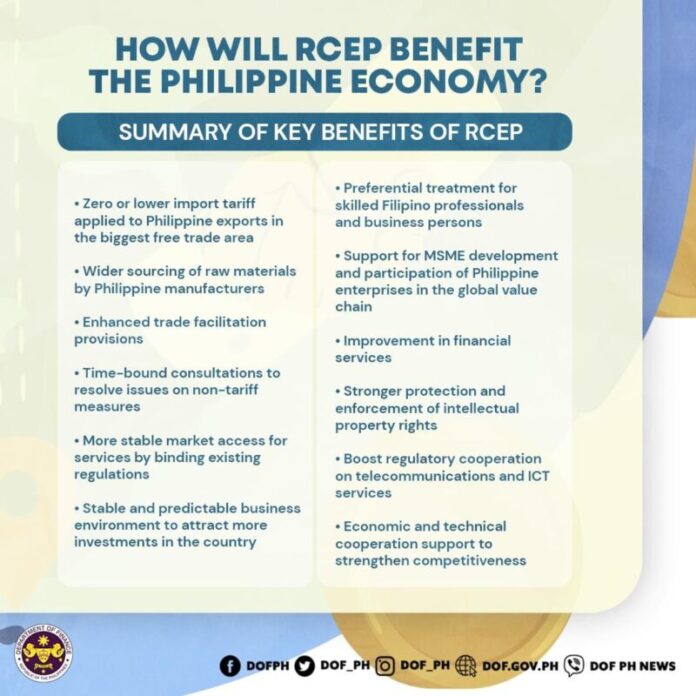-
Economic managers welcomed the Senate ratification of the Regional Comprehensive Economic Partnership agreement
-
Ratification boosts Philippine position as investment hub, according to Socioeconomic Planning Secretary Arsenio Balisacan
-
Finance Secretary Ben Diokno said the mega trade deal is key to a more predictable trade and investment environment
The Regional Comprehensive Economic Partnership (RCEP) ratification was welcomed by economic managers.
Finance Secretary Benjamin Diokno and Socioeconomic Planning Secretary Arsenio Balisacan expressed optimism that the Philippines will reap benefits from RCEP, the world’s largest regional trade bloc which aims to improve market access via the elimination of tariffs and quotas on a wide range of goods.
“With the country’s participation to RCEP, the Philippines has now further strengthened its position as an ideal investment hub in the region as we expand market access, facilitate trade, and align our rules and procedures with participating economies,” Balisacan said in a statement.
For his part, Diokno said: “The ratification of the RCEP is key to a more open, transparent, and predictable trade and investment environment. Deeper economic integration among the RCEP member states will expand the country’s market access for goods and services, attract more investments, and create more and better jobs.”
The ratification came via Senate Resolution No. 485 approved on third and final reading on Ferbuary 21, with 20 affirmative votes, one negative vote, and one abstention
The RCEP is a free trade agreement (FTA) between the ten member states of the Association of Southeast Asian Nations (ASEAN) and its five FTA partners (Australia, China, Japan, New Zealand and Republic of Korea). It was signed on November 15, 2020 after years of negotiation that began in 2012.
The RCEP covers a market of 2.2 billion people with a combined size of US$26.2 trillion or 30% of the world’s gross domestic product. The deal will improve market access with tariffs and quotas eliminated in over 65% of goods traded, and will make business predictable with common rules of origin and transparent regulations. This aims to encourage firms to invest more in the region, including building supply chains and services, and to generate jobs.
The Philippines was the last country to ratify the mega trade deal.
Diokno said the Department of Finance (DOF) has been advocating the benefits of RCEP, noting it provides enhanced trade facilitation provisions that make cross-border trade simpler and more efficient, resulting in a stable and predictable business environment to attract more investments in the Philippines and safeguard the country’s investments abroad. The agreement will also support MSME development and drive participation in the global value chain.
Moreover, DOF said the Philippines will benefit from economic and technical cooperation support in order to strengthen its competitiveness.
Zero or lower import tariffs for Philippine exports such as agricultural products, automotive parts, and garments would give the country more access to bigger markets for its products, the agency said.
As well, Philippine manufacturers would benefit from wider sources of raw materials due to zero or lower import duties on their inputs as well as more flexibility in the rules of the FTA on product manufacturing.
Skilled Filipino professionals and business persons in legal, construction, engineering, and banking services will be given preferential treatment to practice their professions in participating nations.
Finally, DOF said Philippine intellectual property rights will be upheld and given stronger protection to ensure the interests of Filipinos.
Senate president Juan Miguel Zubiri assured concerned groups, particularly in the agriculture sector, that the implementation of RCEP will go hand in hand with developmental and capacity-building programs of the government.
“We have the full commitment of the executive to make RCEP work, and that starts with the successful implementation of developmental programs for various sectors, especially the agri sector,” Zubiri said in a statement.





